
Saturday evenings when the Duke was away were undeniably uninteresting, but Lady Gwynn thought her sister could have hidden her boredom better. Margaret did not even bother to hide her gaping mouth when she yawned.
Still, even for ungracious girls, Bible lessons had an end, and afterwards Hetty always offered up the reward of a story read aloud in her pretty, soothing voice.
Gwynn could speak sweetly when she minded, and her singing voice was her father’s pride, but she lacked one of Hetty’s greatest charms: an exotic accent of her own. That did not stop her from trying on a few when she was alone in her chamber, however.
“I think it is your turn to choose, Gwynn,” Hetty said. “What will you have?”
On Saturday evenings when the Duke was away, even bedtime stories had to be Biblical. Fortunately Gwynn could find romance even in the Bible.
She leaned her damp head back against Hetty’s knee and said, “Let us have the story of David and Bathsheba.”

Margaret snickered, but Hetty laughed aloud. “Oh! My favorite king, then, that King David. After Sigefrith, of course. We shall find a funny joke for tomorrow and surprise your father.”
Hetty’s face was pink with the shame of finding material for jokes in her Bible, but the entire family now engaged in that pastime—much to the bewilderment of poor little Lord David, who was trying to learn English as best he could amidst the Philistines, Jebusites, and Amalekites he must have believed surrounded him.
“She doesn’t want a joke,” Margaret said. “She wants to hear about Bathsheba because she just had her bath, and hoped a man saw her.”
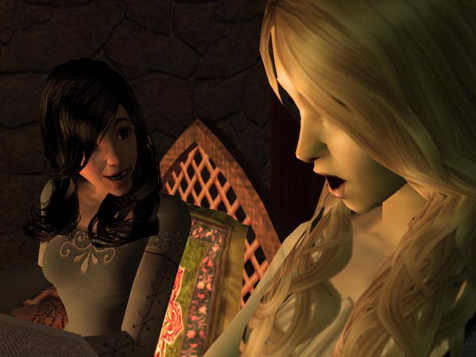
“I did not!” Gwynn gasped.
“Your hair looks wet to me!”
“I did not hope anyone saw me! You liar!”
“Girls…” Hetty scolded.
“Your face looks red to me,” Margaret muttered.
Gwynn wailed, “Hetty!”
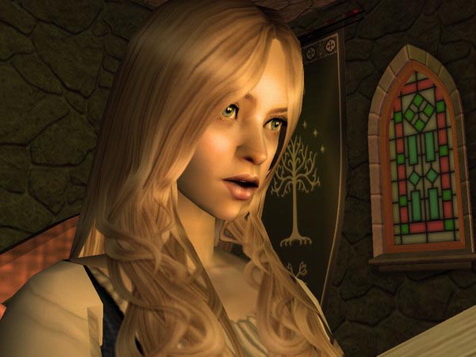
“Margaret,” Hetty said firmly, “that was not kind. I am certain Gwynn did not want any man to see her. I am certain it would be a dreadful thing. Imagine! Poor Bathsheba must have cried and cried.”
“So why did she strip naked outside if she didn’t want a man to see her?” Margaret challenged.
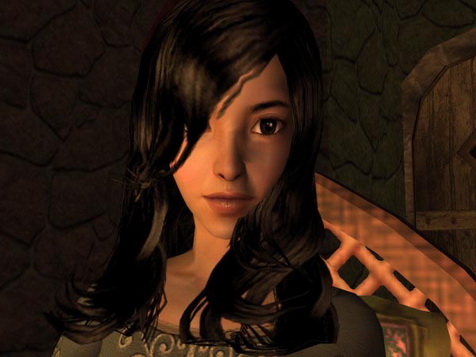
“She did not strip naked,” Gwynn snapped. “You are so vulgar! She disrobed to bathe. And David was on the roof of his palace, looking down into her garden over the walls. It wasn’t her fault. Read us the story, Hetty, before I lose all patience with her.”
Hetty sighed and began paging through her book.

Of course, the only part of the story that truly interested Gwynn was the beginning: how “it came to pass in an eveningtide…”
Gwynn liked to imagine that it had been a hot summer night in Jerusalem, and the sleepless King had gone up onto his roof in search of cool air. Meanwhile a beautiful and lonely woman—and it was easy for Gwynn to pretend she was that woman—had lain in her bed, wilting in the heat, until her worried maids had begged her to go into the garden a while.

And so she had gone out in a diaphanous gown, flitting like a graceful ghost between the flowers, and drinking in the moonlight—for of course there had been a moon. Gwynn always imagined that part lasted a while; even if she had been permitted to go about in diaphanous gowns, girls that looked like dumplings were not known for the grace of their flitting.
But sooner or later her maids would come with pitchers of cool water perfumed with frankincense, and they insisted on making her bathe. She blushed and protested with exquisite modesty, despite believing herself hidden by the high walls from all but the moon and stars, but her naughty maids tore off her gown, leaving her nothing wherewith to cover herself but the long, rippling tresses of her golden hair. And even that they would pull aside, giggling, as they poured the water over her tall and slender body.
Thus from the heights of the castle roof the King was dazzled by brief glimpses of breast or belly or thigh, and her beauty so enchanted him that he forgot the heat of the night in the new fever that had taken over him.
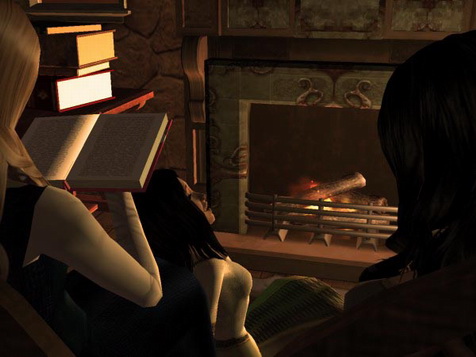
What happened next remained hazy in Gwynn’s imaginings. Messengers would come, and she would surely protest and cry a little, but a King would not be denied, and a King’s love less so. In the end, she would “go in unto him, and lie with him”.
Put in those words, it seemed a beautiful, almost holy thing. Surely “lying with” a man had little to do with the dreadful thumping, grunting, and squealing of menservants and maids that occasionally arose from the closets of her father’s castle. Hetty had never explained to her what part of being with a man involved such exertions.
Gwynn thought it must have been different with gentlemen. Surely King David had been a gentleman, and this was what Hetty had meant with her “lying close together in the bed”. Hetty had assured her she would like it if she let herself. Gwynn thought she would, though she scarcely knew where to begin in her imaginings. That did not stop her from trying to imagine, however.

The rest of the story concerned only the sordid details of unexpected pregnancy, of covering one’s crimes, of treachery, and even of murder by proxy. It was easier to imagine that Uriah the Hittite had been a cruel, old, and ugly husband, and that David had been Bathsheba’s liberator, as well as her lover. It was easier if Gwynn stopped paying attention at the “lay with him” and never bothered herself with Nathan’s damning parable of the rich man who had many sheep and yet took a poor man’s one beloved ewe.
Even Hetty herself skipped the parable on this night, for Cynewulf came knocking at the door before David had quite dispatched Uriah.
In his surprise—or perhaps at the sight of the guilty looks exchanged amongst the three ladies—he forgot his polished manners and demanded, “Where is my father? I thought he was in here with you.”
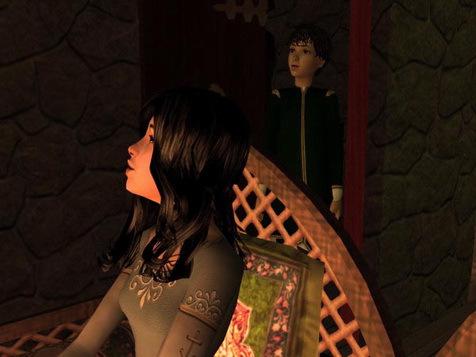
“Well, dear,” Hetty said gently, “he has gone unexpectedly to visit Dunstan and Britamund this night.”
Cynewulf’s mouth fell open in despair. “Why didn’t he tell me?” he asked, so forlornly that the question seemed addressed more to the cruel Fates than to the ladies.
Margaret nevertheless answered him. “Because he wanted to work on a new poem on the ride, and he didn’t want to be interrupted every ten seconds by your jawing.”
“Now, Margaret,” Hetty said, “I think it was rather because it was so late and he did not want to risk anyone falling asleep in the saddle.”
With her “think” Hetty apparently believed she could justify her lie, for Gwynn’s father had said quite plainly that he dared not invite the Old Man on account of the interruptions, though he had generously allowed thirty seconds between them.
“I haven’t fallen asleep in the saddle since I was a little boy!” Cynewulf protested.

“Who is that with you, dear?” Hetty asked, changing the subject with less than her usual grace.
Gwynn had not noticed the tall shadow lurking behind her brother until that moment, though she thought she had been feeling a pair of eyes upon her. She carefully arranged her legs and skirt to display to greatest advantage her ankles, which were, thankfully, slender and graceful and not dumpling-like in the least.
Then the shadow stepped into the firelight, and Gwynn hurriedly swept her feet back beneath her skirt. She thought she had been feeling a sense of foreboding. It was Leofric.
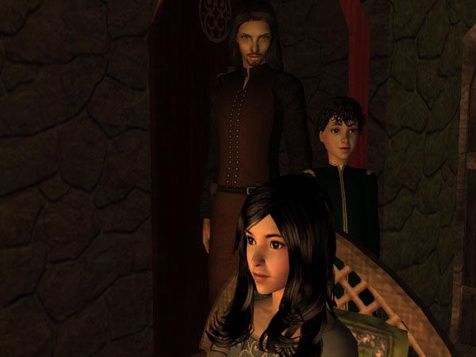
Leofric was welcome at Nothelm, though he had sufficient delicacy or shame to stay away when he was not invited. Only Hetty seemed not to feel the shadow of the unease that clung to him like a cloud to a mountain. Gwynn thought it inelegant to criticize one’s stepmother, but Margaret sometimes confided to her that she thought there was such a thing as being too gracious.
“Oh my heavens!” Hetty cried. “Leofric! What a nice surprise!”
Leofric looked still more stunned by the Duke’s absence than Cynewulf had been. His full and frightening lips moved soundlessly for a moment before he managed to say, “Good evening, ladies. I see I am disturbing…”

Gwynn hurried to rise, foregoing even her usual carefully coordinated sweeping of skirts and pointing of toe. She stood not out of politeness so much as of unwillingness to sit at the feet of that Goliath.
Here was a man, she thought, who need not bother spying over garden walls to see a woman’s body. Every gown was diaphanous to his experienced eyes, and she thought he had been staring at hers before he had come in to the light, though he was carefully avoiding looking at her now. She knew it was because she looked so much like her mother.
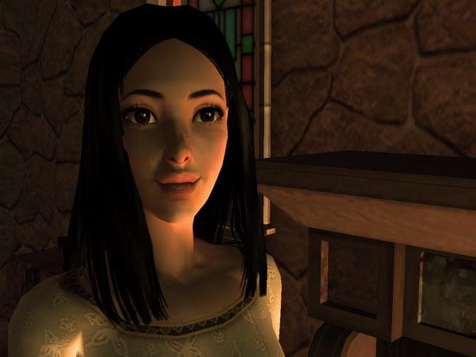
Hetty hastened to meet him, but Margaret neither stood nor even turned her head. As soon as Hetty had passed before her, she slid over on the couch to take her place and put as much distance between herself and the objectionable party as possible. Gwynn thought there might have been such a thing as too little graciousness.

“Nonsense!” Hetty said. “You are disturbing our boredom only. Let us go out to the… hall…”
Leofric ignored her suggestion and bowed to kiss her hand, bending low at the waist to meet the back of her wrist where she held it, at the level of her hip, rather than lifting her hand to his mouth. It was a gesture of remarkable gallantry, especially for so tall and so proud a man, and sufficient to silence even a Duchess, even when she was the wife of Alred.
Leofric had a voice so powerful and so deep that it rang even through walls of stone, but when he stood, he mumbled so softly that Gwynn heard only the beginning and end of his phrase: “Perhaps… to Dunellen.”
Hetty replied aloud, “Is it so urgent? Oh, dear, I hope it is not a grave matter, is it?”
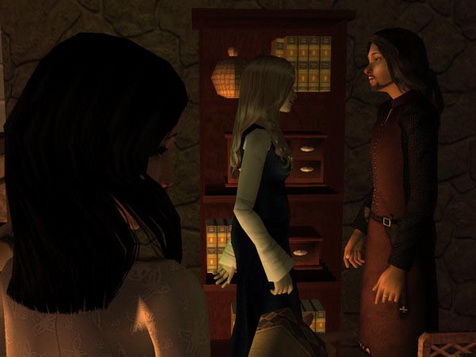
“Hetty…” He looked away from Hetty to glance around the room in search of aid or escape. His gaze sheered away from Gwynn’s face as soon as it passed over it, and Margaret still stubbornly stared at the fire.
“Oh, Leof, nothing bad has happened at the castle?”
“No, Hetty…” he said, not in a weary sigh at her woman’s nonsense, but weakly.
“It is not war, is it?”
He took a step away from her. “War? Hetty…” Gwynn had never seen Leofric so at a loss that even little butterfly Hetty could overwhelm him.
“Is it Eadie? One of the children? Oh, Leof, tell me! It is Sigefrith?”
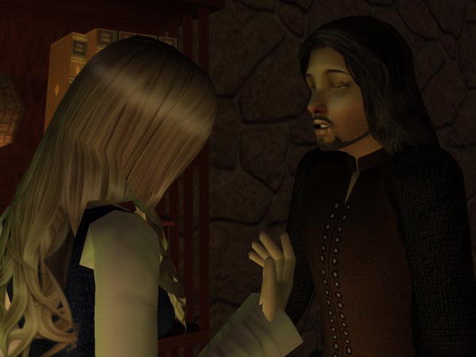
Leofric closed his eyes and began to tip his head back, but he jerked it forward again as his tall body swayed at the imbalance.
“Leof!” Hetty’s fluttering hands clutched at his arms, as if her butterfly strength could keep a crumbling colossus on his feet, or as if a crumbling colossus could keep her on hers.
“Hetty, I meant to speak to your husband. If I had known…”
Leofric took another step back: a stride long enough to free him from her grasp, but also revealing to her his intention to flee. She hurried around him to bar his way.
“Tell me!” she wailed. “I know there is something! If you do not tell me, I shall guess a hundred things, and believe every one until I learn the truth! Is it Sigefrith?”

“Hetty, I have not even been at the castle tonight,” he pleaded.
“You have—” Gwynn could not see Hetty’s face behind her long hair, but she knew her well enough to guess the pallor of her skin by the sudden metallic keening of her voice. “You have been at my sister’s! Wyn told me you meant to come!”
“Hetty…”
Hetty clapped her palms over her cheeks and wailed, “Lili! Du arme! Lieber Gott! Not again! Poor Lili!”
Leofric’s big hand twitched and jerked nervously at his side, like a hawk leashed fast to the level of his hip. His body swayed, like a loose mast held in place by its rigging, or a teetering statue threatening to fall onto the barebacked slaves trying to pull it onto its pedestal. Gwynn waited breathlessly for the ropes to snap.
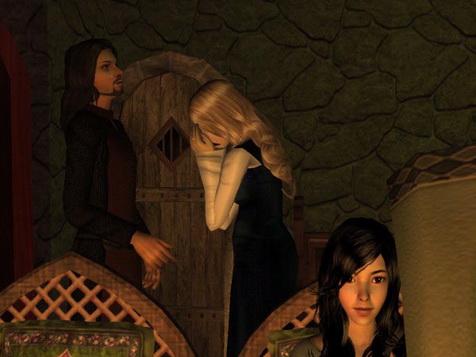
Leofric shook his head almost imperceptibly, and his voice rang hollow like a wind blowing through stone halls. “Hetty, she—had the son she prayed for… a strong son…”
His hand floated up as if the ropes had simply been released, up past his hip, up past Hetty’s mouth, up to his forehead, and then down to his breast, to one shoulder, to the other, in the sign of the Cross.
Hetty screamed and sobbed at once: a long, shrill cry followed by staccato shrieks, like one of the broad-winged kites that nested in the oakwood, and fading as she exhausted her breath, the bird rising up and soaring away.

Cynewulf looked to Gwynn with pleading, uncomprehending eyes. Margaret stared at the fire, horrifically impassive. They were too young, she thought, too insensitive to hear the tragic tale in the eloquent, unspoken words.
Gwynn’s sensitive heart ached and throbbed. Her cheeks were suddenly wet with tears, and when she squeezed her eyes shut, still more spilled forth. Her limbs trembled—her stomach pitched—she was about to faint dead away onto the floor, perhaps striking her head on the hearth and truly dying from the shock: Lili was dead!
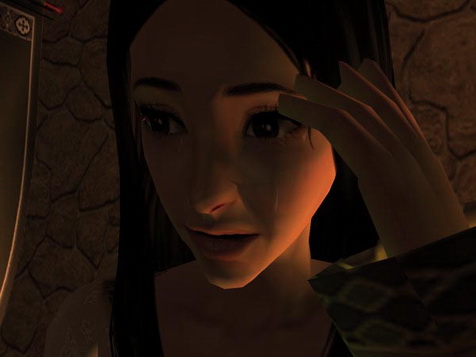
Her brother and sister were too little to understand the rarity of a grown woman—wife and mother—who nevertheless liked nothing better than staying up late into the night, snacking on candy, gossiping and telling stories, dancing and playing games. They were so young that they could not yet even realize that there was more to life than such play.
Cynewulf stood in the shadows, rocking back and forth on his heels and tapping his back against the wall, his eyes vague, as if he were only bored. Margaret did not even have her gaping-mouthed look of boredom from earlier—she simply stared, mute and unfeeling like a lump of stone, in spite of Hetty’s sobs behind her.
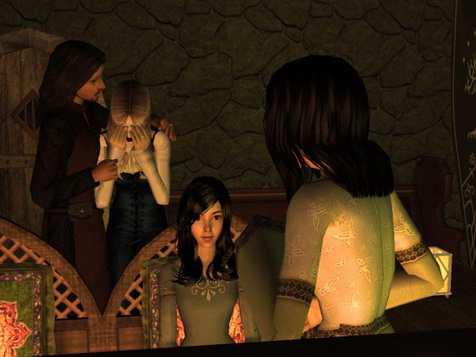
But Gwynn told herself she must not judge them too harshly. Her brother and sister could not yet understand the great griefs of adults: Hetty’s desolation at losing the sister who had once been her only family, her only companion, her only strength through the terrible trial of her first marriage…

And children certainly could not begin to understand the grief of Egelric, which Gwynn had not seen, but which she could certainly imagine. Egelric had lost his true love—the woman who had tamed him, almost, or at least whom he had deigned to follow adoringly like a lapdog grown to a towering size.
And Lili’s child! It was such a tragic and touching start to life, and one Gwynn had often imagined: to be born as one’s mother took her last breath, giving up her last ounce of strength to thrust one forth into the world, with the last, whispered promise that she would meet one again in Paradise—for surely so it had been with Lili and her beloved baby son.
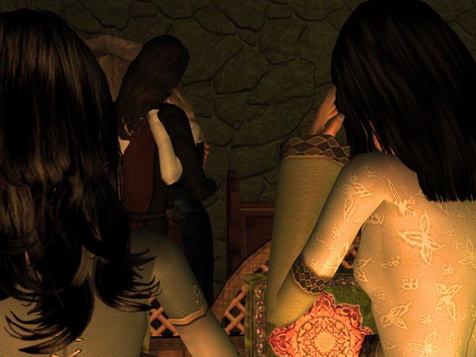
And the half-orphan child would grow up with that guilt and that gratitude… She could already picture the sad eyes he would wear from the day of his birth to the day of his death, when he would at last find peace in his mother’s arms, when he would at last truly smile…
Oh, she felt the tragedy of it down into her bones! She swore she would be a special friend to the child, out of love for his mother, and someday he would come to her, fragile and pleading, “Tell me about her…”
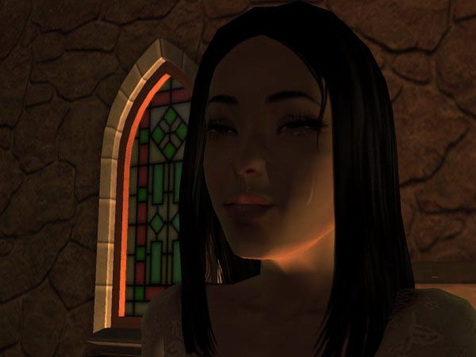
And she would tell what few people could tell, for few had known Lili as she had—few had understood her as she had…
Gwynn had scarcely noticed her sister rising. Suddenly Margaret’s voice clanged at her side like a sword against a shield. “Sir! You will do Her Grace greater service if you ride to Malcolm and Iylaine at once. They must be told.”

Gwynn gasped. It was one thing to be too young to understand, but even children could not permit themselves to interrupt an adult’s first pangs of grief, nor to order a great lord around like a manservant, Duke’s daughter or not, and nor—most shocking of all—to stand dry-eyed and defiant in the face of such manifest tragedy. Better to stand meekly in the shadows like Cynewulf.
But then the Old Man too piped up, pleading, “Hetty, please come upstairs with us, and Hattie shall help you to lie down, and we shall send for Father.”
Hetty gave no sign of having heard, except perhaps for wailing at a slightly higher pitch. Leofric’s massive body had eclipsed hers almost entirely, and Gwynn saw only Hetty’s head bobbing in and out of his shadow as it sought comfort on his right shoulder, on his left, on his breastbone between them, and even against his lips as he gently kissed her forehead.
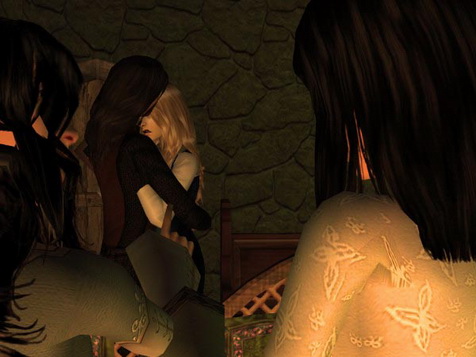
“Sir!” Margaret barked.
Gwynn began to have a queer feeling in her stomach again—not that she was about to faint, but that she was about to be sick. She was no longer certain she herself understood what was happening. She clutched at her stomach, but no one seemed to notice.

Leofric released Hetty and turned about only when he heard Margaret come stomping around the couch, as if she meant to pull him away from her stepmother by main force if necessary.
“Malcolm and Iylaine!” Margaret cried. “You shall tell them, and ride thence to the King. We shall send word to our father.”

Leofric began to turn back to the Duchess again, murmuring, “Hetty, if you—”
“Sir!” Margaret shrieked.
Gwynn believed she could hear the throbbing hearts of everyone in the room in the silence that followed.
Leofric stopped and turned meekly back to her sister. At the level of his hip, his hand twitched towards her, but limply, like a snared partridge in its last throes.
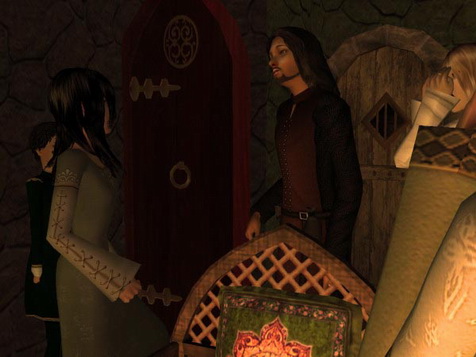
Margaret stood as tall as an eleven-year-old child could, and she lifted her nose still higher, somehow contriving to give herself the air of looking down on the colossus before her.
“Her Grace is indisposed,” Margaret declared, flinging every sharp syllable out like a dart.
Leofric’s wide-eyed stare broadened and deepened until he seemed to look through her. Margaret met it with a glare.
He bowed low at the waist and spoke in the grave voice that rang through stone. “My lady, I am yours to command.”












Oh wow. How sad, and tense.